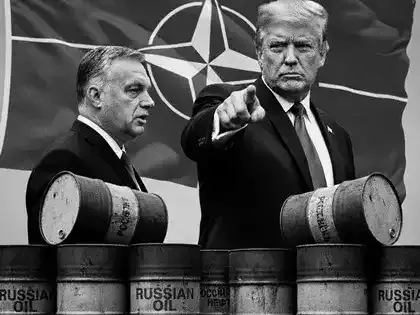NATO ally Hungary sources 80% oil from Russia; Orbán vows to keep buying Russian fuels despite Trump’s pressure

New Delhi: Three years into Russia’s war in Ukraine, one NATO member is still bankrolling the Kremlin in a way that has stunned both Brussels and Washington. Hungary, under Prime Minister Viktor Orbán, now sources more than 80 per cent of its crude oil from Russia, making it the most Russia-dependent economy in the alliance.
Orbán said Friday that Hungary will continue buying fossil fuels from Russia despite pressure from his ally, President Donald Trump. He added that he had told Trump that cutting off Russian energy would be a “disaster” for Hungary’s economy.
“I told the U.S. president ... that if Hungary is cut off from Russian oil and natural gas, immediately, within a minute, Hungarian economic performance will drop by 4 per cent,” Orbán said. “It means the Hungarian economy would be on its knees.”
The irony runs deeper when set against US policy. US President Donald Trump slapped 50 percent tariffs on Indian goods to punish New Delhi for buying Russian oil and weapons. Those duties, among the steepest in the world, included a 25 percent penalty for transactions linked to Moscow, a revenue stream the West insists is fuelling the war in Ukraine.
New Delhi has called the tariffs unfair and insisted it will buy oil wherever it finds the “best deal” to safeguard its 1.4 billion citizens.
External Affairs Minister S. Jaishankar has repeatedly argued that energy security cannot be sacrificed for political theatre.
Speaking at a G20 Foreign Ministers’ meeting in South Africa, Jaishankar said: “Peace can certainly enable development, but by threatening development, we cannot facilitate peace. Making energy and other essentials more uncertain in an economically fragile situation helps no one. Therefore, the way out is to move the needle towards dialogue and diplomacy, not in the opposite direction towards further complications.” Meanwhile, Hungary’s exposure to Russian energy has only deepened. According to a September 2 report from the Atlantic Council, Budapest’s crude imports from Moscow have climbed from 61 percent on the eve of the invasion to 86 percent today.
Its neighbour Slovakia is even more reliant, drawing almost all of its crude from Russia. Both countries also remain tethered to Moscow through the TurkStream pipeline, keeping natural gas supplies flowing despite the European Union’s 2022 pledge to phase out Russian fossil fuels altogether.



